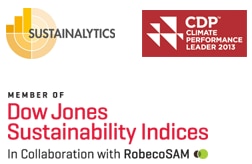SOCIETY
MANAGEMENT APPROACH
Through a corporate human rights risk assessment and other measures to better understand its role in society, Electrolux has procedures in place that help ensure that the company is enhancing its contributions and minimizing its negative impacts on communities it is entering, operating in and exiting.
With a growing presence throughout the world, it is important to have a rigorous way of understanding and addressing the company’s role in society, and its impacts on the local community. For Electrolux, stakeholder dialog, the Ethics Program, Global ISO audits and Code of Conduct work collectively contribute to making Electrolux a trusted and responsible member of local society. These actions are detailed further in Management approach: Labor practices.
Achievements and objectives
For 2013 achievements and future objectives in regards to areas relating to this section, see the performance reviews for People and Operations (Ethical business) and Stakeholders and society (Dialog) as well as Community.
Codes and policies
Two elements of the corporate framework address how Electrolux is to build strong relationships with key stakeholders. The Electrolux Foundation, the company’s operational values, articulates the Group’s aim to be a trusted partner and employer and reinforces the company’s expectations on employees to do the same. The Code of Ethics formalizes the principles by which the Group conducts its relations with employees, shareholders, business partners and communities.
Contributing to society
The Group’s most significant contributions to local society are twofold:
- Economic and social development related to operations and employees; and
- Awareness raising of environmental and human rights issues and promoting behavioral change among consumers, and other stakeholders along the value chain.
The opening of new plants in emerging economies creates opportunities for Electrolux to contribute to economic, social, and environmental development. Among the benefits are jobs, opportunities for local suppliers, technology transfer and improved social and environmental standards.
The Code of Conduct (CoC) and Environmental Policy underscore the Group’s commitment to realizing these benefits and maintaining high standards wherever it is active, including among suppliers. New facilities are aligned with Group practices through CoC training and monitoring procedures together with requirements for certification of plants.
Responsibilities for upholding these policies and maintaining strong relationships with local communities lie primarily with each business sector and local management.
Restructuring
Whether Electrolux is setting up new operations, leapfrogging to new technologies or managing organizational change, it aims to do so responsibly, by striving to be transparent and inclusive, in dialog with those affected.
Restructuring is managed locally within each business area and operational unit, supported by the Group Human Resource function. A network of human resource managers representing Operations for the four Major Appliance sectors meet bi-weekly to exchange ideas. The balance between the global and local is an important one, as decisions made on the local level have the potential to influence perception of the company on the global level. At the same time, Electrolux is a multi-cultural company, and Electrolux prioritizes systems to capture local priorities.
A decision to close a plant or downsize production affects both individuals and communities. When a factory restructuring is under evaluation, the Group recommends that every business area follow a transparent procedure in order to establish the business case for production at that location. If a decision to close or downsize has been made, the restructuring process is to shift its focus to lessen the negative impacts of the decision and ensure that the interests of employees are met by developing a social plan. Employees may be offered assistance such as alternative jobs, pre-retirement schemes, training programs and career coaching.
A stronger voice
Raising awareness on the importance of sustainability issues such as climate-smart living and the importance of appliance recycling is an integral part of sustainability leadership. In addition, Electrolux supports initiatives for societal benefit through communication. Examples include causes close to the hearts of consumers, such as supporting cancer research and school initiatives. These types of engagement are the responsibility of each business sector.
Supporting not-for-profits
Importantly, community initiatives and financial support for not-for-profit organizations are primarily coordinated on the local level in order to respond to, and deliver on, local needs and sector priorities.
Community involvement projects are therefore managed through business sectors, product lines and operational units. Community profiles 2013 examples of local initiatives and their outcomes.
Electrolux also demonstrates its commitment to local communities by contributing its products to worthy causes, supplying appliances to emergency relief efforts, and by matching financial contributions made by employees in times of humanitarian need.
Anti-corruption
Electrolux does not tolerate bribery and corruption in any form, whether direct or indirect. This extends to all business dealings and transactions in all countries where Electrolux operates. To counter corruption, the Group’s Policy on Corruption and Bribery prohibits the offering and accepting of bribes, kickbacks or any other improper benefits.
The Group applies a risk-based approach to training relating to corruption and bribery. The Policy is written particularly for, but not limited to, Group employees responsible for sales, marketing and procurement. They are also trained in the policy. In addition, the Ethics Program includes training and information relating to this area for all employees.
Ethics at Electrolux
Accountability for the Ethics Program lie with the Ethics Steering Group, comprising on Group level, the heads of Sustainability Affairs, Corporate Communications, Legal Department, Management Assurance and Special Assignments (internal auditing) as well as Human Resources and Organizational Development, complimented by the Ethics Coordination Group.
It is important to create a company culture that encourages its employees to discuss and report on ethics issues. The program therefore includes Ethics training and the Ethics operated by a third party. Through the Helpline, which is confidential and operated in local languages, employees can report suspected incidents of non-compliance to codes and policies.
Employees are encouraged to speak to their manager, HR Department, internal audit function or another appropriate person in the organization if they wish to report an incident of potential non-compliance or, if it feels more comfortable, to use the Helpline. An additional route for reporting is to contact the Electrolux Audit Committee, which can also be submitted anonymously. Anti-corruption and public policy outlines 2013 outcomes of the Helpline.
Public policy
Each region is responsible for establishing contacts with their respective policy-makers. This dialog is carried out by authorized Electrolux employees. In 2014 Electrolux aims to put in place greater coordination of public policy issues relating to the environment with a Global policy group.
As outlined in the Code of Ethics, Electrolux observes neutrality with regard to political parties and candidates. Neither the Electrolux name, nor any resources controlled by Group companies may be used to promote the interests of political parties or candidates. Awareness-raising on the Electrolux position on political involvement is part of Ethics at Electrolux training.
Employees active at the European Affairs department are members of the Society of European Affairs Practioners (SEAP). They have signed its Code of Conduct and taken part in its training program.
Anti-trust and anti-competitive behavior
Every employee is expected to abide by the rules of fair competition. Both the Code of Ethics and Policy on Antitrust underline the Group’s commitment to counter anti-competitive behavior. Electrolux has developed internal guidelines on anti-trust that are regularly reviewed and updated. Electrolux does not allow its employees to enter into unlawful agreements and understandings that are anti-competitive or to unlawfully exchange non-public or sensitive information with customers or other third parties.
The Group applies a risk-based approach to training relating to anti-trust. The Antitrust Policy is written particularly for, but not limited to, employees responsible for sales, marketing and procurement. The policy and its supporting guidelines are implemented by way of special training for targeted employee groups. In addition, the Ethics Program, which is being rolled out among all employees, includes training and information relating to this area.
StopSearchHereCEO Statement

In 2013 we continued to deliver above our growth target and delivered 4.5% in organic sales growth.
CEO Statement

I'm convinced that raising product efficiency for the growing middle class is where long-term shareholder value creation lies.
Our products

Electrolux is the only appliance manufacturer in the industry to offer complete solutions for both consumers and professionals. The focus is on innovative and energy-efficient products in the premium segments.
Sustainability
Achieving the Group's vision of sustainability leadership is crucial to realizing the business strategy. The objective is to develop smarter, more accessible, resource-efficient solutions that meet people's needs and improve their lives. Read the comprehensive sustainability performance review.
Awards & recognition

Financial Reporting
Net sales for the Electrolux Group in 2013 amounted to SEK 109,151m, as against SEK 109,994m in the previous year. The organic sales growth was 4.5%, while currencies had an impact of -5.3%.
